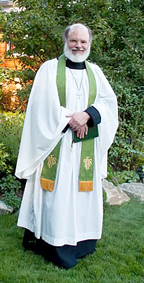July 2019
The Messenger
Supplement
Isaiah 45
:7
|
“There is no real joy in this world except that which the Word
brings when it is believed.”
[Luther’s Works
4:4] |
|
|
Rejecting Pop Culture
Theology and Discovering the God Worth Living For, 2017). So
how again does this verse help us endure hardships? Luther
writes: “God does not want us to… imagine that there are several
gods: one, the source of all good; the other, the source of all
evil. God wants us to regard the evils that we experience as
coming to us with His permission…. God permits evils to come to
us; for it is His will that, when we have been chastened, we
cast ourselves on His mercy…. By… these works God aims to humble
us that we might… obey His will” (Luther’s
Works 13:135).
These insights have guided my ministry over these forty
years – being chastened, begging for mercy, being humbled and
strengthening obedience. Luther shows how all of these come
together in Isaiah 45:7. So he concludes that “it is an
outstanding gift of the Holy Spirit to believe that when God
sends evil, He is still… merciful” (LW
12:374). Luther calls this double nature God’s
duplex verbum or
double word (LW 3:242
– and my article, “Duplex Verbum,”
Pro Ecclesia, Fall
1994). Other similar verses are Exodus 4:11, Deuteronomy 32:39,
1 Samuel 2:6, Job 1:21, Psalm 75:7, Proverbs 10:29, Jeremiah
31:10, Ezekiel 17:24, John 9:39, Romans 9:13, James 4:12 and
Revelation 3:7.
Pastor Marshall |
I then told him that he had misread our parish
constitution. What he was following was the rule for
meetings having to do with matters not regarding the
pastor. But if the meeting is about the pastor, then
before there can be a vote, the Church Counsel has to
determine if the charges have any merit (and later an
outside investigation found that there was no merit to
the charges). So I told him if he defies our
constitution, has the meeting anyway, and I’m fired, I
will not abide by the decision because the meeting was
unconstitutional.
He then erupted and yelled at me saying I was a bully
and a tyrant. I was taking over the church and running
out everyone I didn’t like. I also was betraying our
friendship. I said back it wasn’t so. I was just trying
to follow our constitution. If he thought it was wrong,
then he should first have a meeting to change the
constitution to allow for the kind of meeting he wanted.
He then hung up without a goodbye. The next day he
resigned as president and left the church. A few years
later he divorced and moved out of West Seattle. I never
had another conversation with him.
What’s to be learned from all of this? First, love can
go awry and become phony as his did for me (Luke 22:48,
Romans 13:10). Second, having a fair constitution and
knowing what it says is important – for the law curbs
bad behavior (1 Timothy1:8–11,
Luther’s Works
45:90). Third, hitting below the belt – attacking you
while you’re on vacation – happens in the church with
impunity. Cheating and lying flourish in the church. So
never assume the best (Psalm 118:8, John 2:24–25,
LW 30:326).
And fourth, Luther was right – regarding the great Jan
Hus (1369–1415) being literally burned alive by the
church – that “no wrath in the entire world is more
cruel than that of this bloodthirsty and hypocritical
church” (LW
1:260). He then adds, lest we think this doesn’t apply
to us, that Lutherans of every time and place “are all
Hussites,” even if they never knew it (LW
48:153).
Pastor Marshall
|
